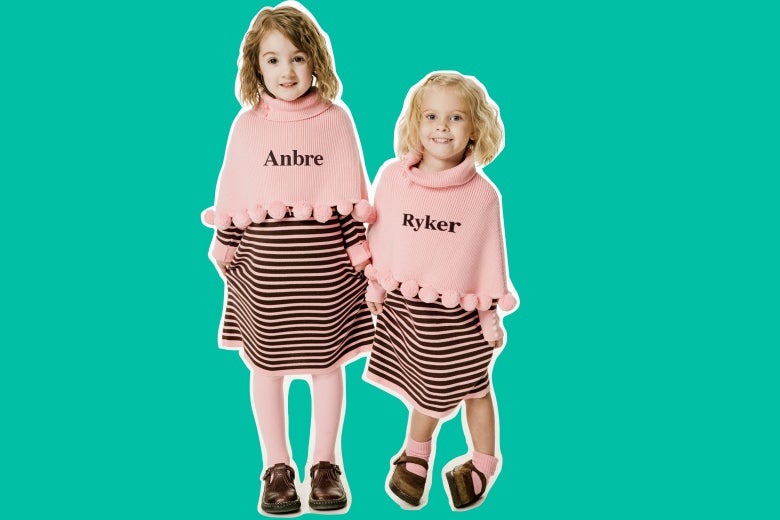Funny Ways to Call Crazy Mormon People
Leave Ryker and Questin and Anbre Alone
It makes perfect sense that Mormons give their kids such unusual names.

By now, most people have heard the jokes about Utah, the Mormons who live there, and their penchant for inventing strange baby names out of thin air. Several years ago, there was a viral YouTube video paying homage to the genre of the weird Utah baby name, sending up everyone from Aunestee to Kynzlee. And Wednesday night, Allison Czarnecki entertained the Twitterverse by tweeting out all the bizarre names in her kid's Utah junior high yearbook. Highlights include Ryker and Questin and what appears to be an attempt at a modern, sophisticated twist on my own name: Haleigh.
I grew up in Utah, and I remember, as a teenager, making small talk with a man doing home repairs in my parents' house, who told me proudly he'd just had a daughter he named Haley. But he and his wife had decided to spare her the closing Y and to spell her name H-a-l-e. But, he griped, a few people had already mistakenly called her "Hale," like hail. "How odd!" I remember saying.
Though I present as a fairly normal-named woman of Scandinavian descent, the truth is I too have a WUN (weird Utah name). In 1986, my parents opted to give me the 203rd most popular baby-girl name of the year. But they also gifted me a very special middle name: Star. In my parents' defense, Star is also my grandma Dawna's middle name, so they didn't exactly invent it. It's also the middle name of my younger cousin Bayley, though her parents opted to add an extra R, meaning our family gatherings include a Dawna Star, a Haley Star, and a Bayley Starr.
When I was a kid, none of the names around me really struck me as unusual. It wasn't until I got to college in Tennessee and started talking about my beloved best friends at home, Kachiri (named for an Amazonian character in a book her dad had read) and Anbre (like Breann, but with the syllables swapped), that eyebrows began to get raised and I realized it wasn't so normal, at least at Vanderbilt, to be a white American woman with a name nobody had ever heard before. To this day, I think my friends' names are beautiful names, probably in part because I know the lovely human beings they belong to and couldn't possibly imagine them with any names other than the ones they've got. But Kachiri sometimes resents her unusual name, not because it's unique but because it doesn't reflect her actual heritage at all (Jewish on one side and Idaho Mormon on the other). Anbre likes hers. But they both opted for fairly traditional names for their own kids, and, they tell me, they often text each other to laugh about absurd names they hear in their kids' classes and activities.
By now, I've heard all the jokes about Utah names, but what I haven't heard is a unified theory of just why the Mormon people of Utah are so inclined to create them. I humbly offer two hypotheses.
The first is my historical-cultural theory—that the penchant for invented names among Mormons lies in its very foundation: It goes all the way back to its founder, Joseph Smith, who had to come up with the names of hundreds of figures to populate the faith's foundational text that he wrote, the Book of Mormon. So I guess you could say it all started there, with Mormon himself.
Now, for the faithful Mormons who believe that Smith's writing of the Book of Mormon was a translation of what he found on the golden plates, and not an invention in itself, this theory may be lacking. But even if you believe Mormon and Nephi and Amnor and Laman were real historical figures who once roamed the North American continent, the idea that Mormons come from a people with melodious and distinctive names is still a reasonable explanation for today's Mormons' own belief that they deserve the same.
My second theory is more sociological. Due to the LDS church's teachings, which enthusiastically urge procreation and center the nuclear family above all else, there are a LOT of kids in Utah—women in Utah give birth to an average of 2.3 kids in their lifetimes, while the national average is just 1.8 children.
The families in Utah tend to be relatively homogenous—overall, Utah is becoming increasingly diverse, both racially and religiously, but that diversity is overwhelmingly concentrated in its capital, Salt Lake City. In small towns like the one where I grew up, Payson (located about 60 miles south of Salt Lake), the population is almost 96 percent white and 93 percent Mormon. That overwhelming portion of Mormons matters a lot. It means almost all of these kids share a culture, and a strong one—one that sends them to the same churches to learn the same religious curriculum week after week, that encourages them to wear similarly modest clothes and use polite language, and to plan for future booze-free lives centered around family and faith.
So if you're a Mormon kid in Utah, it can be hard to stand out from the pack. A differently spelled name or a new name altogether might be a reasonable way to firm up a sense of individuality from the first day. Why bring yet another Erin into the world when you can introduce an Aeryn, or better yet, an Aroarin? Why shouldn't the "peculiar people," as Mormon scripture puts it, have peculiar names as well? If Mormons are guilty of anything, it's a desire to distinguish their kids in a sea of other young children from very similar backgrounds. And don't all parents want their kids to be stars?
Source: https://slate.com/human-interest/2018/05/leave-ryker-and-questin-and-anbre-alone-it-makes-perfect-sense-that-mormons-give-their-kids-unusual-names.html
0 Response to "Funny Ways to Call Crazy Mormon People"
Post a Comment